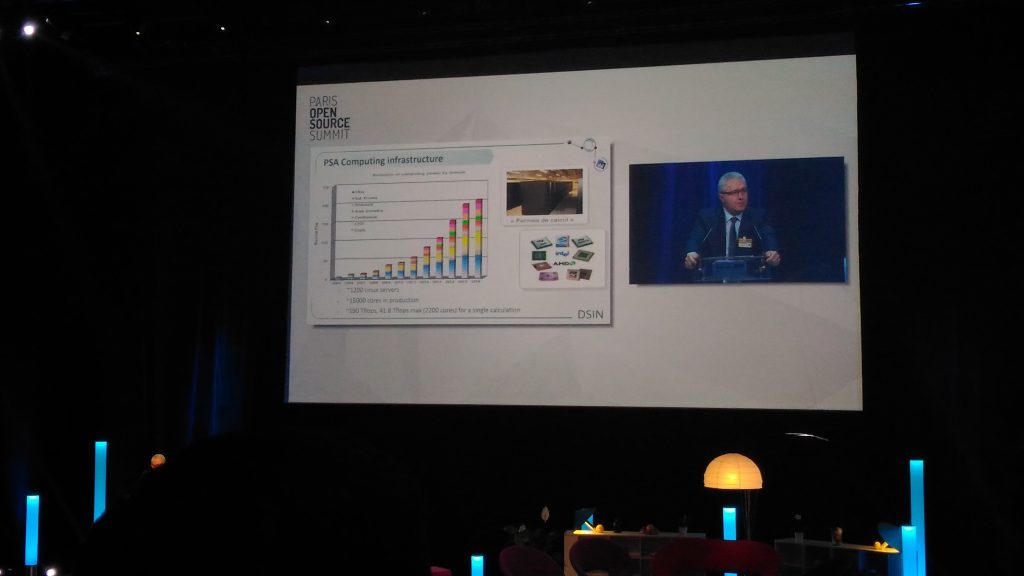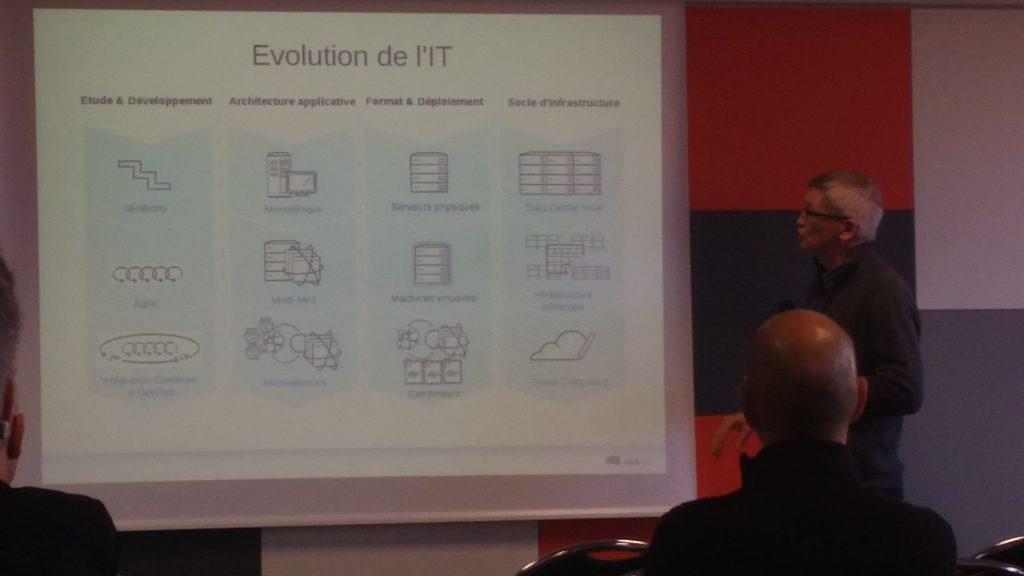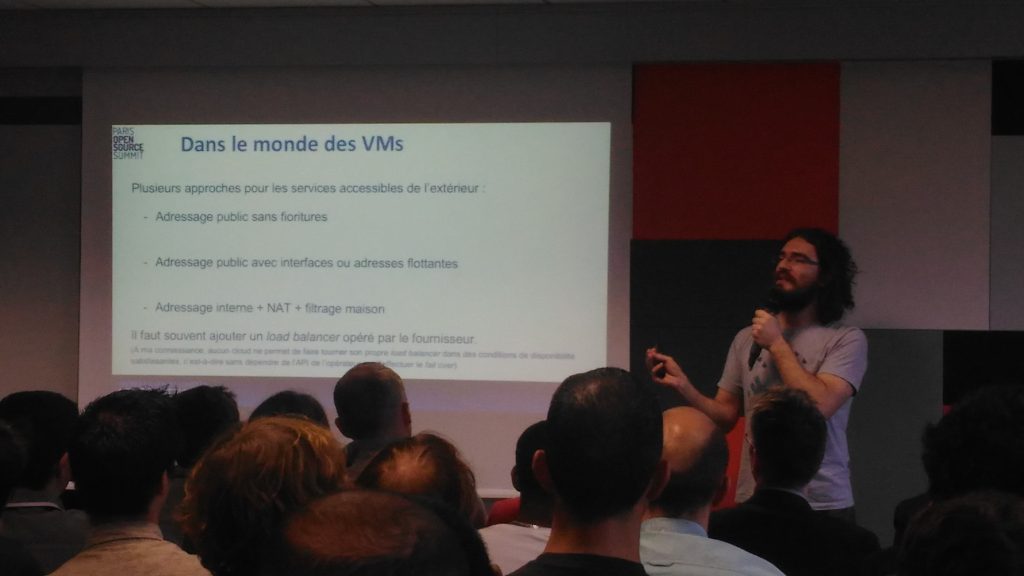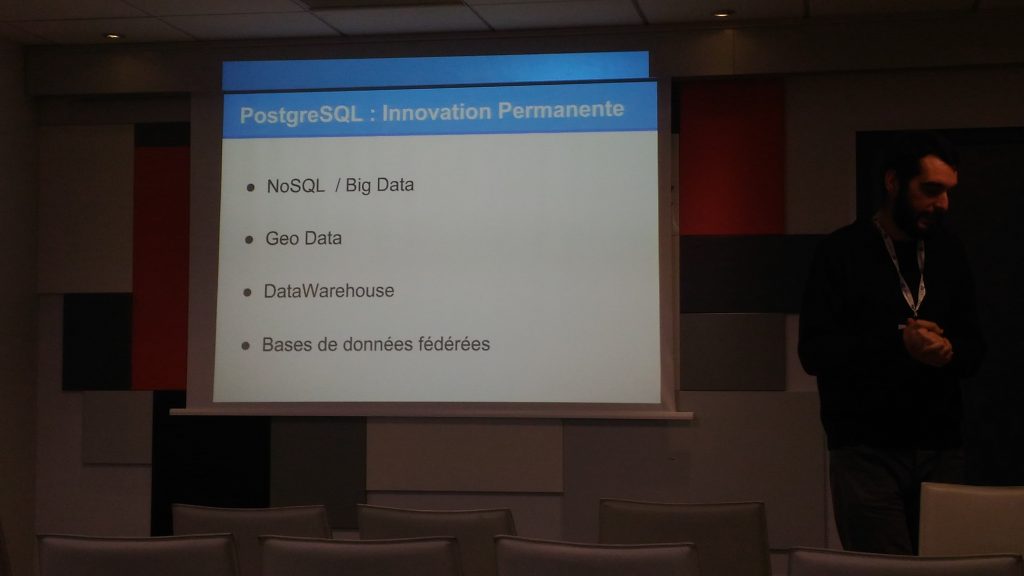Attention ceci est mon brouillon avant de faire une belle documentation sur Docker (il y a à boire et à manger).
Maintenant on a mieux compris le système (enfin j’ai mieux compris) et l’on sait qu’il faut faire les choses dans une certain ordre (Les précédents POST n°1 et n°2 ) .
- On a compris qu’il fallait une partition spéciale (par exemple Btrfs) pour Docker.
- On a compris qu’il devait y avoir une version « spéciale » pour Docker sous Oracle Linux. Mais on a préféré prendre la version standard. Par exemple on doit avoir le fichier /etc/sysconfig/docker .
- On a compris qu’il fallait avant tout faire le fichier Dockerfile
, puis le « docker build » et « docker run« . - On a aussi l’option -v qui permet de faire le lien entre l’hôte et le container.
- On a pris le risque de mettre le dernier noyau 4.1.12-32.2.3.el7uek.x86_64 , afin d’avoir la dernière version de Docker. Ce n’est jamais bon d’être sur les derniers version car on est le premier a se prendre les nouveaux problèmes.
Maintenant on va pouvoir lancer des containers en utilisant la syntaxe :
docker run -p <hôte_port1>:<container_port1> -p <hôte_port2>:<container_port2> …
Car jusqu’à présent on n’a pas vu de port en écoute, c’est parce que l’on n’a pas fait le lien entre le port hôte et le port du conteneur.
Plutôt que de continuer avec HAproxy on va faire avoir PostgreSQL qui me semble plus simple à mettre en oeuvre dans un premier temps.
Je redonne les informations de mon docker :
[root@localhost ~]# docker info Containers: 1 Running: 0 Paused: 0 Stopped: 1 Images: 4 Server Version: 1.11.0 Storage Driver: btrfs Build Version: Btrfs v3.19.1 Library Version: 101 Logging Driver: json-file Cgroup Driver: cgroupfs Plugins: Volume: local Network: bridge null host Kernel Version: 4.1.12-32.2.3.el7uek.x86_64 Operating System: Oracle Linux Server 7.2 OSType: linux Architecture: x86_64 CPUs: 1 Total Memory: 739.1 MiB Name: localhost.localdomain ID: X7PA:FHLQ:XKJJ:IH72:P5HO:ULDH:ZMID:VGSB:KOMV:AJGF:SEY6:PTGV Docker Root Dir: /docker Debug mode (client): false Debug mode (server): false Registry: https://index.docker.io/v1/
On se lance donc dans PostgreSQL, d’abord on regarde ce qui est disponible :
[root@localhost ~]# docker search postgres NAME DESCRIPTION STARS OFFICIAL AUTOMATED postgres The PostgreSQL object-relational database ... 1909 [OK] abevoelker/postgres Postgres 9.3 + WAL-E + PL/V8 and PL/Python... 10 [OK] macadmins/postgres Postgres that accepts remote connections b... 8 [OK] jamesbrink/postgres Highly configurable PostgreSQL container. 5 [OK] linuxkonsult/postgres A Postgres trusted build installed with Chef. 5 [OK] cptactionhank/postgres 4 [OK] kampka/postgres A postgresql image build on top of an arch... 2 [OK] azukiapp/postgres Docker image to run PostgreSQL by Azuki - ... 2 [OK] eeacms/postgres Docker image for PostgreSQL (RelStorage re... 2 [OK] icescrum/postgres PostgreSQL image for iceScrum. 1 [OK] clkao/postgres-plv8 Docker image for running PLV8 1.4 on Postg... 1 [OK] jgiannuzzi/postgres-bdr Docker image for PostgreSQL with BDR support 1 [OK] baselibrary/postgres ThoughtWorks Postgres & PostGIS Docker Image 1 [OK] travix/postgres A container to run the PostgreSQL database. 0 [OK] timbira/postgres Postgres containers 0 [OK] blacklabelops/postgres Postgres Image for Atlassian Applications 0 [OK] livingdocs/postgres Postgres v9.3 with the plv8 extension inst... 0 [OK] opencog/postgres This is a configured postgres database for... 0 [OK] beorc/postgres Ubuntu-based PostgreSQL server 0 [OK] vrtsystems/postgres PostgreSQL image with added init hooks, bu... 0 [OK] vibioh/postgres PostgresQL Server 0 [OK] coreroller/postgres official postgres:9.4 image but it adds 2 ... 0 [OK] khipu/postgres postgres with custom uids 0 [OK] aheimsbakk/postgres-nosync `postgres` docker with `synchronous_commit... 0 [OK] akilli/postgres debian:jessie based PostgreSQL image 0 [OK]
Maintenant je regarde quel est la dernière version de PostgreSQL :
FROM postgres:latest MAINTAINER toto toto@cyber-neurones.org RUN yum install postgresql && yum install postgresql-server RUN /etc/init.d/postgresql initdb # Modification de la configuration RUN echo "host all all 0.0.0.0/0 md5" >> /var/lib/pgsql/data/pg_hba.conf RUN echo "listen_addresses='*'" >> /var/lib/pgsql/data/postgresql.conf # Le port en ecoute EXPOSE 5432 # Ajout des volumes pour faire un backup VOLUME ["/etc/postgresql", "/var/log/postgresql", "/var/lib/pgsql"] # Pour lancer postgres CMD ["/var/lib/pgsql/bin/postgres", "-D", "/var/lib/pgsql/data", "-c", "config_file=/var/lib/pgsql/data/postgresql.conf"]
Je me lance donc dans le test de mon premier fichier ! La première étape c’est le build :
[root@localhost ~]# docker build -t my-postgres . Sending build context to Docker daemon 15.36 kB Step 1 : FROM postgres:latest latest: Pulling from library/postgres efd26ecc9548: Already exists a3ed95caeb02: Pull complete aef28b128f84: Pull complete 5c6681af0d52: Pull complete 43fd2592d569: Pull complete 90b140d542bd: Pull complete 9f56303d7da8: Pull complete 75f16d91384c: Pull complete a7e55988e47e: Pull complete 6980fe8c2745: Pull complete 94512148bc3a: Pull complete 055e85b433f4: Pull complete Digest: sha256:3ab14aa8758e62570f589848a93039a55c9e3ab123090c58721374d4f633ff71 Status: Downloaded newer image for postgres:latest ---> 0f3af79d8673 Step 2 : MAINTAINER toto toto@cyber-neurones.org ---> Running in 4ee6e08a7c8c ---> dadadc713dfa Removing intermediate container 4ee6e08a7c8c Step 3 : RUN yum install postgresql && yum install postgresql-server RUN /etc/init.d/postgresql initdb ---> Running in 5cfa35a21346 /bin/sh: 1: yum: not found The command '/bin/sh -c yum install postgresql && yum install postgresql-server RUN /etc/init.d/postgresql initdb' returned a non-zero code: 127
Aie le yum ne passe pas … j’ai ajouté l’option -y mais pas mieux (l’option -y permet de répondre y aux questions, c’est impératif en ligne de commande).
RUN yum install postgresql -y && yum install postgresql-server -y RUN /etc/init.d/postgresql initdb
La commande yum n’est pas dispo, on est donc sur une base Débian. On va donc faire un apt-get ! ou alors on va partir d’une base de Fédora (proche de Oracle Linux) pour avoir la commande yum.
Voici donc mon nouveau fichier :
FROM fedora MAINTAINER toto toto@cyber-neurones.org RUN yum install postgresql -y RUN yum install postgresql-server -y RUN /etc/init.d/postgresql initdb # Modification de la configuration RUN echo "host all all 0.0.0.0/0 md5" >> /var/lib/pgsql/data/pg_hba.conf RUN echo "listen_addresses='*'" >> /var/lib/pgsql/data/postgresql.conf # Le port en ecoute EXPOSE 5432 # Ajout des volumes pour faire un backup VOLUME ["/etc/postgresql", "/var/log/postgresql", "/var/lib/pgsql"] # Pour lancer postgres CMD ["/var/lib/pgsql/bin/postgres", "-D", "/var/lib/pgsql/data", "-c", "config_file=/var/lib/pgsql/data/postgresql.conf"]
On refait un test :
[root@localhost ~]# docker build -t my-postgres . Sending build context to Docker daemon 15.36 kB Step 1 : FROM fedora ---> ddd5c9c1d0f2 Step 2 : MAINTAINER toto toto@cyber-neurones.org ---> Using cache ---> f170274e277c Step 3 : RUN yum install postgresql -y ---> Running in a8bd83110986 Yum command has been deprecated, redirecting to '/usr/bin/dnf install postgresql -y'. See 'man dnf' and 'man yum2dnf' for more information. To transfer transaction metadata from yum to DNF, run: 'dnf install python-dnf-plugins-extras-migrate && dnf-2 migrate' Last metadata expiration check performed 0:00:47 ago on Thu Apr 14 17:50:24 2016. Dependencies resolved. ================================================================================ Package Arch Version Repository Size ================================================================================ Installing: postgresql x86_64 9.4.7-1.fc23 updates 1.1 M postgresql-libs x86_64 9.4.7-1.fc23 updates 240 k Transaction Summary ================================================================================ Install 2 Packages Total download size: 1.3 M Installed size: 4.4 M Downloading Packages: -------------------------------------------------------------------------------- Total 75 kB/s | 1.3 MB 00:18 Running transaction check Transaction check succeeded. Running transaction test Transaction test succeeded. Running transaction Installing : postgresql-libs-9.4.7-1.fc23.x86_64 1/2 Installing : postgresql-9.4.7-1.fc23.x86_64 2/2 Verifying : postgresql-9.4.7-1.fc23.x86_64 1/2 Verifying : postgresql-libs-9.4.7-1.fc23.x86_64 2/2 Installed: postgresql.x86_64 9.4.7-1.fc23 postgresql-libs.x86_64 9.4.7-1.fc23 Complete! ---> 398c5e8555cb Removing intermediate container a8bd83110986 Step 4 : RUN yum install postgresql-server -y ---> Running in 1dc2f23f63bd Yum command has been deprecated, redirecting to '/usr/bin/dnf install postgresql-server -y'. See 'man dnf' and 'man yum2dnf' for more information. To transfer transaction metadata from yum to DNF, run: 'dnf install python-dnf-plugins-extras-migrate && dnf-2 migrate' Last metadata expiration check performed 0:01:15 ago on Thu Apr 14 17:50:24 2016. Dependencies resolved. ================================================================================ Package Arch Version Repository Size ================================================================================ Installing: postgresql-server x86_64 9.4.7-1.fc23 updates 4.0 M Transaction Summary ================================================================================ Install 1 Package Total download size: 4.0 M Installed size: 17 M Downloading Packages: -------------------------------------------------------------------------------- Total 585 kB/s | 4.0 MB 00:07 Running transaction check Transaction check succeeded. Running transaction test Transaction test succeeded. Running transaction Installing : postgresql-server-9.4.7-1.fc23.x86_64 1/1 Verifying : postgresql-server-9.4.7-1.fc23.x86_64 1/1 Installed: postgresql-server.x86_64 9.4.7-1.fc23 Complete! ---> 7592731d113b Removing intermediate container 1dc2f23f63bd Step 5 : RUN /etc/init.d/postgresql initdb ---> Running in 29aa04f7d09a /bin/sh: /etc/init.d/postgresql: No such file or directory The command '/bin/sh -c /etc/init.d/postgresql initdb' returned a non-zero code: 127
Encore un échec, mais je ne baisse pas les bras 😉 Voici ma version n°3 du fichier :
FROM fedora MAINTAINER toto toto@cyber-neurones.org RUN dnf install postgresql -y RUN dnf install postgresql-server -y RUN postgresql-setup initdb # Modification de la configuration RUN echo "host all all 0.0.0.0/0 md5" >> /var/lib/pgsql/data/pg_hba.conf RUN echo "listen_addresses='*'" >> /var/lib/pgsql/data/postgresql.conf # Le port en ecoute EXPOSE 5432 # Ajout des volumes pour faire un backup VOLUME ["/etc/postgresql", "/var/log/postgresql", "/var/lib/pgsql"] # Pour lancer postgres CMD ["/var/lib/pgsql/bin/postgres", "-D", "/var/lib/pgsql/data", "-c", "config_file=/var/lib/pgsql/data/postgresql.conf"]
Maintenant le test :
[root@localhost ~]# docker build -t my-postgres . Sending build context to Docker daemon 15.36 kB Step 1 : FROM fedora ---> ddd5c9c1d0f2 Step 2 : MAINTAINER toto toto@cyber-neurones.org ---> Using cache ---> f170274e277c Step 3 : RUN dnf install postgresql -y ---> Running in 3cbd03b57500 Last metadata expiration check performed 0:00:43 ago on Thu Apr 14 17:57:13 2016. Dependencies resolved. ================================================================================ Package Arch Version Repository Size ================================================================================ Installing: postgresql x86_64 9.4.7-1.fc23 updates 1.1 M postgresql-libs x86_64 9.4.7-1.fc23 updates 240 k Transaction Summary ================================================================================ Install 2 Packages Total download size: 1.3 M Installed size: 4.4 M Downloading Packages: -------------------------------------------------------------------------------- Total 75 kB/s | 1.3 MB 00:18 Running transaction check Transaction check succeeded. Running transaction test Transaction test succeeded. Running transaction Installing : postgresql-libs-9.4.7-1.fc23.x86_64 1/2 Installing : postgresql-9.4.7-1.fc23.x86_64 2/2 Verifying : postgresql-9.4.7-1.fc23.x86_64 1/2 Verifying : postgresql-libs-9.4.7-1.fc23.x86_64 2/2 Installed: postgresql.x86_64 9.4.7-1.fc23 postgresql-libs.x86_64 9.4.7-1.fc23 Complete! ---> 3d2c98e008bc Removing intermediate container 3cbd03b57500 Step 4 : RUN dnf install postgresql-server -y ---> Running in ea14d4661833 Last metadata expiration check performed 0:01:10 ago on Thu Apr 14 17:57:13 2016. Dependencies resolved. ================================================================================ Package Arch Version Repository Size ================================================================================ Installing: postgresql-server x86_64 9.4.7-1.fc23 updates 4.0 M Transaction Summary ================================================================================ Install 1 Package Total download size: 4.0 M Installed size: 17 M Downloading Packages: -------------------------------------------------------------------------------- Total 488 kB/s | 4.0 MB 00:08 Running transaction check Transaction check succeeded. Running transaction test Transaction test succeeded. Running transaction Installing : postgresql-server-9.4.7-1.fc23.x86_64 1/1 Verifying : postgresql-server-9.4.7-1.fc23.x86_64 1/1 Installed: postgresql-server.x86_64 9.4.7-1.fc23 Complete! ---> 7dde38450b15 Removing intermediate container ea14d4661833 Step 5 : RUN postgresql-setup initdb ---> Running in 1fa62834212e WARNING: using obsoleted argument syntax, try --help WARNING: arguments transformed to: postgresql-setup --initdb --unit postgresql /usr/share/postgresql-setup/library.sh: line 63: find: command not found Failed to get D-Bus connection: Operation not permitted Failed to get D-Bus connection: Operation not permitted FATAL: no db datadir (PGDATA) configured for 'postgresql.service' unit The command '/bin/sh -c postgresql-setup initdb' returned a non-zero code: 1
On va dire que l’on a encore avancé mais pas facile de trouver de la documentation claire pour l’instant. En plus du yum qui a changé en dnf, la commande l’initialisation de postgres n’est plus la même. La compatibilité ascendante c’est pour demain 😉
[root@localhost ~]# cat Dockerfile FROM fedora MAINTAINER toto toto@cyber-neurones.org RUN dnf install postgresql -y RUN dnf install postgresql-server -y RUN postgresql-setup --initdb --unit postgresql # Modification de la configuration RUN echo "host all all 0.0.0.0/0 md5" >> /var/lib/pgsql/data/pg_hba.conf RUN echo "listen_addresses='*'" >> /var/lib/pgsql/data/postgresql.conf # Le port en ecoute EXPOSE 5432 # Ajout des volumes pour faire un backup VOLUME ["/etc/postgresql", "/var/log/postgresql", "/var/lib/pgsql"] # Pour lancer postgres CMD ["/var/lib/pgsql/bin/postgres", "-D", "/var/lib/pgsql/data", "-c", "config_file=/var/lib/pgsql/data/postgresql.conf"] [root@localhost ~]# docker build -t my-postgres . Sending build context to Docker daemon 15.36 kB Step 1 : FROM fedora ---> ddd5c9c1d0f2 Step 2 : MAINTAINER toto toto@cyber-neurones.org ---> Using cache ---> f170274e277c Step 3 : RUN dnf install postgresql -y ---> Using cache ---> 3d2c98e008bc Step 4 : RUN dnf install postgresql-server -y ---> Using cache ---> 7dde38450b15 Step 5 : RUN postgresql-setup --initdb --unit postgresql ---> Running in b4dd8e2cef49 /usr/share/postgresql-setup/library.sh: line 63: find: command not found Failed to get D-Bus connection: Operation not permitted Failed to get D-Bus connection: Operation not permitted FATAL: no db datadir (PGDATA) configured for 'postgresql.service' unit The command '/bin/sh -c postgresql-setup --initdb --unit postgresql' returned a non-zero code: 1
Je ne vais pas faire d’initdb …
[root@localhost ~]# docker build -t my-postgres . Sending build context to Docker daemon 15.36 kB Step 1 : FROM fedora ---> ddd5c9c1d0f2 Step 2 : MAINTAINER toto toto@cyber-neurones.org ---> Using cache ---> f170274e277c Step 3 : RUN dnf install postgresql -y ---> Using cache ---> 3d2c98e008bc Step 4 : RUN dnf install postgresql-server postgresql-contrib -y ---> Using cache ---> 29c873629d39 Step 5 : RUN echo "host all all 0.0.0.0/0 md5" >> /var/lib/pgsql/data/pg_hba.conf ---> Using cache ---> 4a99cf64311c Step 6 : RUN echo "listen_addresses='*'" >> /var/lib/pgsql/data/postgresql.conf ---> Using cache ---> 4b431bcfe6fb Step 7 : USER postgres ---> Using cache ---> b88497ef1a95 Step 8 : ENV PGDATA /var/lib/pgsql/data ---> Using cache ---> 9272c705d631 Step 9 : EXPOSE 5432 ---> Running in b2e4c043bc2e ---> a6ea2c236302 Removing intermediate container b2e4c043bc2e Step 10 : VOLUME /etc/postgresql /var/log/postgresql /var/lib/pgsql ---> Running in cf06d787cecf ---> cffe96473050 Removing intermediate container cf06d787cecf Step 11 : CMD /var/lib/pgsql/bin/postgres -D /var/lib/pgsql/data -c config_file=/var/lib/pgsql/data/postgresql.conf ---> Running in 7690289ad7cb ---> 1204d059861e Removing intermediate container 7690289ad7cb Successfully built 1204d059861e [root@localhost ~]# cat Dockerfile FROM fedora MAINTAINER toto toto@cyber-neurones.org RUN dnf install postgresql -y RUN dnf install postgresql-server postgresql-contrib -y # Modification de la configuration RUN echo "host all all 0.0.0.0/0 md5" >> /var/lib/pgsql/data/pg_hba.conf RUN echo "listen_addresses='*'" >> /var/lib/pgsql/data/postgresql.conf USER postgres ENV PGDATA /var/lib/pgsql/data #RUN initdb --data-checksums # Le port en ecoute EXPOSE 5432 # Ajout des volumes pour faire un backup VOLUME ["/etc/postgresql", "/var/log/postgresql", "/var/lib/pgsql"] # Pour lancer postgres CMD ["/var/lib/pgsql/bin/postgres", "-D", "/var/lib/pgsql/data", "-c", "config_file=/var/lib/pgsql/data/postgresql.conf"]
Maintenant je lance :
[root@localhost ~]# docker run -p 5432:5432 --name postgres -e POSTGRES_PASSWORD=password -d postgres a590ea4020c45974f68d2e9b7296d83e4176a2dca109510abd72a80b0d26fc11 [root@localhost ~]# ss -at State Recv-Q Send-Q Local Address:Port Peer Address:Port LISTEN 0 128 *:ssh *:* LISTEN 0 100 127.0.0.1:smtp *:* ESTAB 0 0 192.168.1.13:ssh 192.168.1.10:62127 LISTEN 0 128 :::ssh :::* LISTEN 0 128 :::postgres :::* LISTEN 0 100 ::1:smtp :::* [root@localhost ~]# docker ps CONTAINER ID IMAGE COMMAND CREATED STATUS PORTS NAMES a590ea4020c4 postgres "/docker-entrypoint.s" 5 minutes ago Up 5 minutes 0.0.0.0:5432->5432/tcp postgres
Le port semble être en écoute, maintenant il me faut perfectionner la conf de PostgreSQL et installé des outils en local afin d’avoir accès à la base.
[root@localhost ~]# yum install postgresql [root@localhost ~]# yum install telnet
Je vais donc modifier ce fichier :
FROM fedora MAINTAINER toto toto@cyber-neurones.org RUN dnf install postgresql -y RUN dnf install postgresql-server postgresql-contrib -y # Modification de la configuration RUN echo "host all all 0.0.0.0/0 md5" >> /var/lib/pgsql/data/pg_hba.conf RUN echo "listen_addresses='*'" >> /var/lib/pgsql/data/postgresql.conf RUN echo "tcpip_socket = true" >> /var/lib/pgsql/data/postgresql.conf USER postgres ENV PGDATA /var/lib/pgsql/data #RUN initdb --data-checksums # Le port en ecoute EXPOSE 5432 # Ajout des volumes pour faire un backup VOLUME ["/etc/postgresql", "/var/log/postgresql", "/var/lib/pgsql"] # Pour lancer postgres CMD ["/var/lib/pgsql/bin/postgres", "-D", "/var/lib/pgsql/data", "-c", "config_file=/var/lib/pgsql/data/postgresql.conf"]
Le but étant de faire fonctionner le connexion à la base par la suite.







